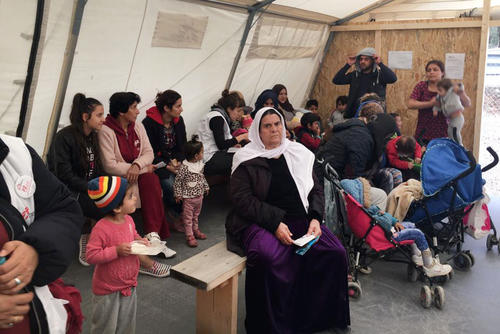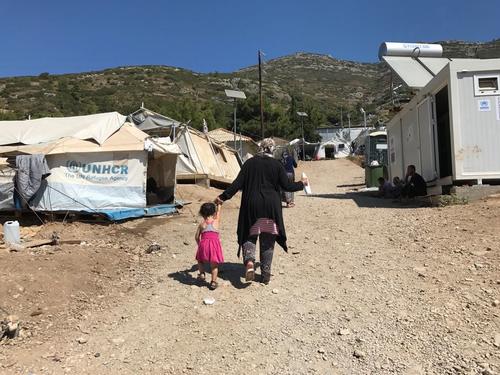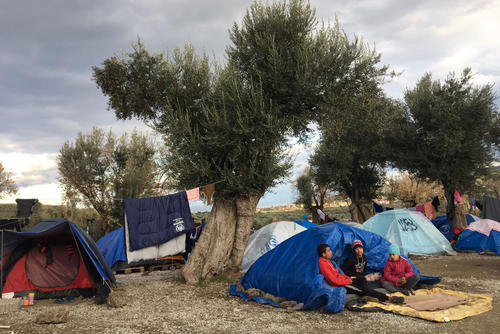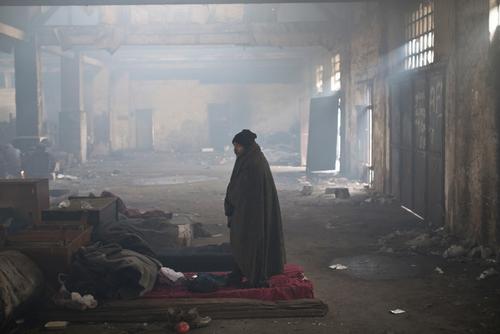MSF has been providing medical and humanitarian assistance to asylum seekers and migrants in Greece since 1996. In 2014, MSF expanded its activities in Greece to meet the needs of asylum seekers arriving on the Greek islands and mainland from Turkey. Since 2016, MSF medical teams in Greece have offered services including primary healthcare, treatment for chronic diseases, sexual and reproductive healthcare, physiotherapy and mental healthcare. Today, MSF provides medical services in the wider area of Athens, in Epirus, as well as on the islands of Lesvos and Samos. Between January and October 2017, MSF medical teams in Greece provided more than 26,980 consultations.
Aegean Islands
Lesvos
MSF has been working in multiple locations on the island of Lesvos since July 2015 adapting its activities according to the needs of the migrants and asylum seekers arriving. MSF suspended its medical and mental health activities in the Registration and Identification Center of Moria following the EU-Turkey agreement in March 2016, in protest of its inhumane impact on the living conditions of people stuck there. In October 2016, MSF opened a clinic in the town of Mytilini for asylum seekers and migrants from across the island, including patients referred by the outreach team from Moria and Kara Tepe refugee camps. The clinic has provided primary healthcare, care for chronic diseases sexual and reproductive healthcare, as well as mental healthcare. In August 2017, it shifted its focus to covering the medical and mental health needs of survivors of torture, sexual violence and severe mental health disorders. MSF’s team on Lesvos provided more than 2,650 medical consultations, 1,320 consultations with patients seeking advice for sexual and reproductive health issues, as well as more than 1,560 clinical psychological care sessions in 2017. Specialised psychiatric care is also provided when needed.
Taking into account the increased arrivals, the overpopulated camps, the worsening living conditions, and the low rate of transfers for vulnerable people from Lesvos to the mainland, in late November MSF launched an emergency intervention, in coordination with the National Centre for Disease Control & Prevention (KEELPNO), to improve the living conditions and access to medical care for the asylum seekers and migrants on Lesvos over the upcoming tough winter months. The mobile clinic set up close to Moria camp is offering primary healthcare for children under 16 years old, ante- and post-natal care for pregnant women, as well as psychological support to patients and their parents. The medical consultations with minors include malnutrition screening, evaluation of the vaccination status, and - if needed - referral to KEELPNO for additional vaccinations and/or to the local hospital or outpatient clinic for further specialist treatment. Medical consultations with pregnant women focus on identifying pregnancies at risk, including through ultrasound checks and referrals to the local hospital for specialist syndromes checks. Psycho-education and group psychological sessions are provided, as well as individual mental health consultations for light to moderate cases. Severe mental health cases, as well as survivors of sexual violence and torture, are referred for medical care and mental healthcare to the MSF clinic in Mytilini. MSF is also donating winterization items - blankets, sleeping bags, mattresses, hygiene kits - to volunteer networks active on Lesvos, for immediate distribution in Moria camp. MSF is also assessing options for improvements in the water and sanitation infrastructure in the camp, in order to reduce morbidities related to poor hygiene conditions.
Samos
MSF has been working on the island of Samos since November 2015. MSF currently runs a temporary shelter for vulnerable people on the island which can host up to 80 people. They are identified and referred by the team itself as well as other organisations working in the Registration & Identification Centre (RIC). The RIC has become severely overcrowded during the last few months due to delays in lifting geographical restrictions and transferring vulnerable, admissible and eligible asylum seekers to the mainland, as well as a lack of capacity to scale up reception conditions. MSF provides the shelter residents with basic medical services and referrals to the local hospital for specialised care, always accompanied by a nurse and a cultural mediator. MSF also provides mental health care; the team has held more than 650 clinical psychological sessions within 2017, with the cohort of patients exhibiting mainly mood and post-traumatic stress disorders. With access to psychiatric care on the island extremely limited, MSF recently started organising psychiatric consultations with patients in need every two weeks.

MSF supports the ‘Samos Volunteers’ group with in-kind donations and provides information on legal matters and individual assistance with asylum claims in partnership with the Greek Council for Refugees (GCR). In 2017, 192 individuals or families were represented and supported by GCR/MSF lawyers, among which 52 were patients of MSF. In September 2017 MSF ran a vaccination campaign for children between 6 months and 15 years old residing in the MSF shelter and shelters run by other NGOs. The campaign covered all standard vaccines foreseen by public health protocols. Moreover, in coordination with the Centre for Disease Control & Prevention (KEELPNO) and MedIn, a broader vaccination campaign was held for children in the RIC, which will continue by KEELPNO staff over the next months, as MSF provided relevant training to them. In October 2017 MSF started a medical intervention in the police station of Vathy, in collaboration with other actors and competent authorities, in order to improve the living conditions and access to services for the detainees.
Athens
Day Care Centre
Since April 2016, MSF has been offering sexual and reproductive health (SRH) care, mental health (MH) care, health promotion and education, as well as distributing hygiene kits, through mobile units in the refugee camps in Attika and Thermopyles. In September 2016, in order to respond to the medical and mental health needs of vulnerable people residing all around the city, MSF opened a day care centre in downtown Athens focusing on SRH and MH activities, including care for victims of sexual violence and treatment for transmittable sexual diseases. As of June 2017, MSF also started providing treatment for chronic diseases, to cover the needs of patients staying in Athens on a longer term basis. The MSF team has held more than 5,060 consultations with patients seeking medical help for SRH issues, as well as more than 1,520 clinical psychological care sessions within 2017. More than 310 people received medical treatment for chronic diseases.
The day care centre has strengthened its social worker department to provide patients with a more comprehensive social support, while it has a strong referral component to the national healthcare system, with specialised cultural mediators accompanying patients to follow up appointments at hospitals. The outreach team provides health promotion and education sessions in camps and alternative shelters around the city: in early June 2017, the camp in Elliniko was evacuated and most MSF patients - now residing in other facilities - were referred for follow-up at the day care centre. MSF has gradually handed over the cases it had been following in the Thermopyles camp to other actors present there. In Rafina camp, where MSF has had SRH and MH consultations since May 2017, the outreach team is still following-up on the existing cohort, facilitating referrals to the day care centre or the nearby hospital. An assessment is currently reviewing the needs in other camps throughout the Attica region to refocus the work of the mobile units. MSF recently launched an innovative travel medicine service automatically activated for any MSF patient upon disclosure of their intention to move, within Greece or abroad. The service is designed to equip asylum seekers and migrants on the move with health advice, needed vaccinations, as well as with a minimum integrated medical, psychosocial and legal support package.
Victoria Square Health Centre
MSF has been providing primary healthcare to migrants and asylum seekers in a health centre near Victoria Square in Athens since February 2016. In May 2016, MSF expanded its activities to cover mental healthcare as well. The MSF team has held more than 5,200 medical consultations in 2017, mostly related to respiratory tract and skin infections, as well as musculoskeletal and psychosomatic complaints. As of July 2017, as a means to facilitate migrants and asylum seekers’ access to the public health system, MSF started supporting the Sixth Athens Municipality Clinic with cultural mediators for Farsi and Arabic speakers, with donations of equipment, as well as with capacity building offered to the medical staff for the provision of routine vaccinations.
The MSF team has performed more than 1,680 clinical psychological care sessions within 2017, both in the Victoria Square health centre in Athens, as well as through mobile units in the refugee camps of Malakasa, Lavrio and Ritsona, in the wider Attica region. Individual and group sessions are offered to help people to psychologically cope with their current situation, and with symptoms of depression, anxiety and post-traumatic stress disorder. Specialised psychiatric care and hospitalisation is also provided when needed. MSF is currently handing over its mental health activities in the camps to the Greek Centre for Disease Control and Prevention (KEELPNO), as well as to other actors providing specialised mental health care in Athens. The social service of the health centre provides information about the public- or NGO-run services available, and facilitates patients’ requests regarding accommodation, cash assistance, issuance of administrative documents, etc.
Clinic for Victims of Torture
MSF has been providing comprehensive care to survivors of torture and other forms of violence and ill-treatment in Athens since October 2014, when it opened a specialised clinic, in collaboration with established local partners Day Centre Babel and the Greek Council for Refugees. Recognising the high prevalence of torture among the migrant and refugee population, as well as their crucial need for rehabilitation, the clinic has so far cared for more than 480 people from 40 countries - mainly Democratic Republic of Congo, Iran, Syria and Afghanistan. The MSF team has developed a multi-disciplinary approach to assist survivors in coping with their medical and mental health problems resulting from the systematic violence they have been subjected to. The majority of beneficiaries present with musculoskeletal, neurological and gastrointestinal issues, as well as post-traumatic stress disorder, extreme anxiety and depression symptoms. In addition to medical, mental health and physiotherapeutic care, torture survivors are offered social support and integration services, as well as legal aid to facilitate their access to the asylum system.
The MSF team has carried out more than 1,160 medical consultations, 980 clinical psychological care consultations, 810 physiotherapy consultations, as well as 950 social worker consultations in 2017. MSF has been advocating for improved identification, care and rehabilitation for victims of torture in Greece. This advocacy has been directed mainly towards the health authorities, as well as other NGOs, and has involved working closely with the MSF medical team on Lesvos. The identification of victims of torture on the islands as vulnerable cases is indeed crucial for getting them moved to the mainland, where they can access better care and protection.
Epirus
An MSF mobile unit provides psychological and psychiatric healthcare to around 1,000 migrants and asylum seekers residing in four open sites (Agia Eleni, Doliana, Filipiada, Konitsa), and in flats made available by different actors in the urban area of Ioannina. MSF is also performing consultations in the service centre managed by OXFAM/Arsis in Ioannina in cooperation with other actors. In December 2017 MSF will hand over its activities to Arsis; a capacity building process among the two teams has been in place since September 2017. Since May 2017, numerous people coming from the Greek islands are regularly being transferred to Epirus, most of which are vulnerable cases with extended protection and medical needs. Although the refugee population remains quite small, the severity and complexity of the cases management are significant. The MSF team has performed more than 1,200 clinical psychological care sessions within 2017 (including referrals to a psychiatrist) and was following about 60 active files at the end of October 2017.






